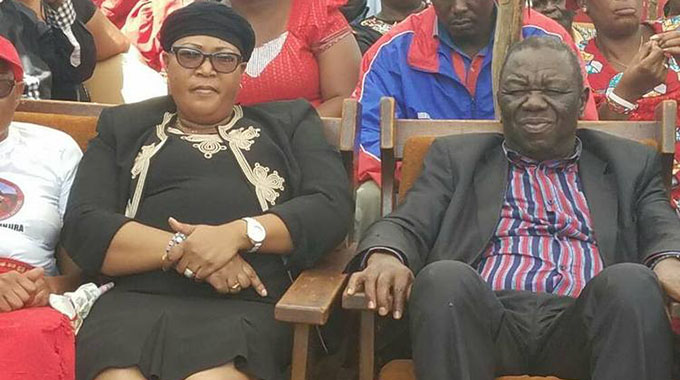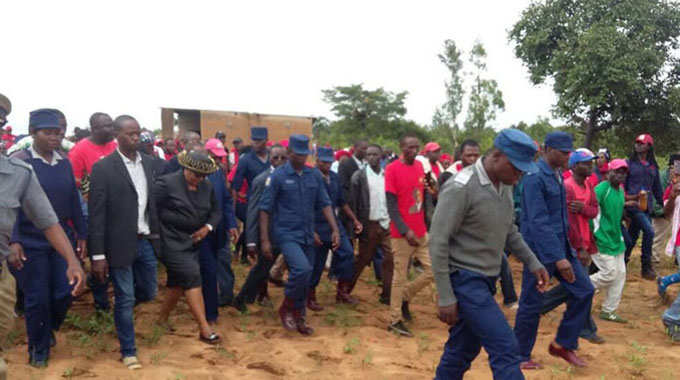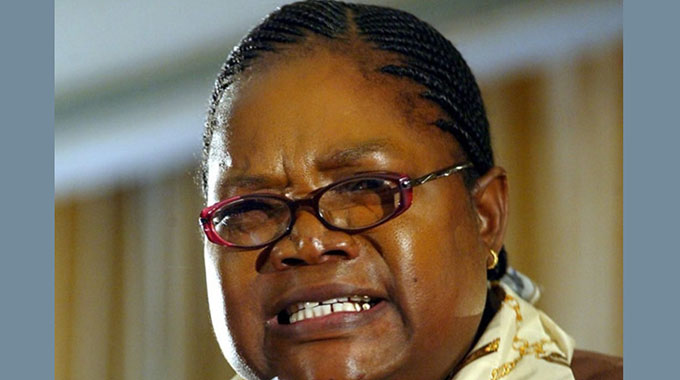Khupe demise and the gender equality trajectory

Ruth Butaumocho Gender Editor
Growing up in Kenya, Ms Sheila Githaiga (33) had often admired women leaders who would appear on television chanting political slogans while campaigning for political office.
Politics became part of her life such that when she was eligible to contest for parliamentary elections, Ms Githaiga immediately threw her hat into contest for a senatorial seat in her hometown of Nyeri, under the Jubilee Party last year.
But her passion for politics ended prematurely after she was hounded out of the campaigns, assaulted and was left for dead by supporters of a male rival from the same party.
Although she is domiciled in Kenya and might never set foot in Zimbabwe in the near future, Ms Githaiga’s story mirrors that of politically embattled MDC-T deputy president Dr Thokozani Khupe and many other women, who have been hounded out of politics, and have chosen to maintain their silence for fear of reprisals.
Circumstances between Ms Githaiga and Dr Khupe might not be the same, neither are they motivated by similar political impulses, but people can draw similarities to the situation that Dr Khupe finds herself in.
The political arena in most countries appears to be far from offering a level playing field for female politicians, at least going by various events and incidences where women have been systematically pushed out of the political circle through violence, persecution and other means.
The fierce succession debate within the MDC-T that resulted in the ascendancy of Nelson Chamisa to head the opposition party following the death of Morgan Tsvangirai on February 14, have since claimed the scalp of Dr Khupe, who was expected to take over, after being successfully elected as the vice president during the party’s congress in 2014.
Not only has she been elbowed out of the party, but Dr Khupe has endured political violence, assaults and public humiliation within her own party in the last few months.
What is catastrophic in this political debacle has been the silence of other women and several organisations that purport to champion the political interests of the female populace in Zimbabwe.
There has been deafening silence of the women’s movement, who should have been rallying behind the dejected Dr Khupe in her darkest moments.

THINGS FALL APART . . . Dr Khupe (in black) is escorted by the police after rowdy MDC T youths threatened to beat her up during the late Morgan Tsvangirai’s burial in Humanikwa Village, Buhera
No solidarity messages have been forthcoming from organisations that are currently lobbying for the amendment of Section 124 of the Constitution for the extension of proportional representation of women in the august House.
These are the same organisations that have been agitating for gender equality in all spheres of influence, particularly in politics and leadership in fulfilment of Convention of the Elimination of Discrimination against Women (CEDAW), which is now considered to be the universal bill of rights for women.
I am also referring to several organisations that have been encouraging women to nurture future female political leaders through profiling role models worth emulating from different communities.
It smacks of hypocrisy that the same organisations, same institutions and legion of women have remained mum on Dr Khupe’s political fate.
Women’s organisations tired
Women in Politics Support Unit (Wipsu), however, came to the defence of women’s organisations, saying there were high levels of violence in Zimbabwe’s political parties that manifest in different spaces, making it practically impossible for the civic society to address.
Wipsu director Mrs Sakhile Sifelani-Ngoma challenged the Government to rein in perpetrators of violence from political parties.
“The story is no longer about what the women’s movement is doing to reach out to the victims of political violence, but it is about the action that the Government and political parties need to take to end violence that has become a culture in Zimbabwe.
“For the record, we have been consistently working with political parties to end violence.
“We have been speaking out against violence, from the time Trudy (Stevenson) was assaulted, during Dr Mujuru’s persecution, to today.

Dr Mujuru
“We have been giving out statements to the media condemning violence, but nothing much is being done to rein in persecutors.
“We are now tired. We are tired of going to hospitals to visit victims of political violence.
“We are tired of being asked for money for medical bills by victims of political violence.
“Dr Khupe’s case is an example of a high profile politician whose case has been amplified by the media, but there are hundreds of cases of women who are victims of political violence, which the media has never reported on.”
Mrs Sifelani-Ngoma accused the media of being an accomplice in perpetuating violence through giving acres of space to perpetrators of violence at the expense of the victims.
Dr Khupe stands out as one role model worth profiling, who has defied odds to become one of the few female political stalwarts in the league of Dr Joice Mujuru, Cde Auxilia Mnangagwa, Margaret Dongo, Ednah Madzongwe, Cde Oppah Muchinguri-Kashiri and several other resilient women.
She is among women who endured the bruising and bare-knuckled campaigns staged mainly by their male opponents and still excelled.
The fate that has befallen Dr Khupe is a culmination of different struggles she has had to endure at various stages from the time she went into politics to where she is right now.
Dr Khupe resilient
In all the melee, including the time she went through her cancer treatment, Dr Khupe has proved to be resilient, fearless, aggressive and an intelligent woman, blessed with oratory skills.
Dr Khupe had to overcome several hurdles among them social stigma, patriarchal vilification and economic setbacks to be at the helm of the MDC-T alongside a few powerful male politicians.
The public says Dr Khupe has been hard done by her fellow women both from Zanu-PF, MDCT and from several political parties, who have not offered her a shoulder to cry on and commiserate with her at this difficult time, while using this as an opportunity to consolidate their political base because of their numerical significance across the political divide.
Women not a political minority
With 52 percent of the population being women and constituting 54,5 percent of the 5,3 million registered voters in the forthcoming plebiscite, women cannot consider themselves to be a political minority.
“It, therefore, defies the logic why such a huge populace – who commands such colossal political influence – have not come out in the open to commiserate with Dr Khupe and rally behind her in her darkest moments,” a source who only identified himself as Cde Zvandigora said.
This probably explains why only a “handful” female politicians met in Bulawayo last weekend for a solidarity gathering with the troubled MDC-T faction leader to give her support in what they called victimisation by male politicians on her because she is a woman.
Speaker after speaker, among them Priscilla Misihairabwi-Mushonga, dismissed MDC-T national organising secretary Abednego Ncube and Lucy Matibenga exhorted women to rally behind each other in the forthcoming elections.
Matibenga couldn’t have said it better when she urged women in the country to unite and give their full support to Dr Khupe, saying an injury to one woman was an injury to all women.
Women’s political participation trivialised?
Sadly, women are failing to grasp that what Dr Khupe is going through should not be viewed as her political demise, but points to a political narrative where women’s participation in politics will continue to be trivialised.
Women should not trivialise Dr Khupe’s demise as a mere intra-party fighting, pitting her with Chamisa, but as a serious challenge to women’s existence, sustenance and relevance in the Zimbabwean political arena.
It also points to a sad trajectory of brutalisation of female politicians who dare to challenge cronyism and expand their political vision beyond their political party’s expectations.
Over the years, several female politicians have often found themselves at the mercy of orchestrated attacks within their own political parties, while their fellow women silently watch from the sidelines.
Many will remember in 2006, how the then MDC member Lottie Getrude “Trudy” Stevenson was severely assaulted by youths aligned to the rival camp led by the late Tsvangirai.
Stevenson, who is now Zimbabwe’s diplomat to Gambia and Senegal, sustained a deep gash on the back of her head during the attack, which her colleagues said was inflicted by a machete; a fractured cheek bone; a broken radius and ulna (arm bones); a broken wrist; and bruises on her back and chest.
Because of high political polarisation, only those female organisations and individuals who supported opposition leaders offered solidarity messages, while those aligned with the ruling Zanu-PF were conspicuous by their absence.
The same fate befell Dr Mujuru in 2014, the then Vice President, when she was hounded out of Zanu-PF by the G40 faction at the behest of former First Lady Grace Mugabe, on spurious allegations.
Save for a few women, the majority chose to watch from the terraces, while Dr Mujuru was being persecuted from all corners within her own party.
Four years down, Dr Khupe finds herself at the mercy of the very same party which helped her nurture her political ambition and with no single women’s organisation within reach to walk with her in such difficult times.
While some critics have come out in the open saying she lacks political gravitas and should have captured the restive crowd at Harvest House – which Chamisa did – when Morgan Tsvangirai died and every MDC-T supporter came to Harare to mourn the departed leader. Some analysts say she does not deserve the persecution she is currently going through.
Without delving into deep-seated factional politics in MDC and other reasons for the source of conflict and her ultimate decision to ditch the main MDC-T, women should rally behind Dr Khupe on sentimental reasons and as matter of principle.
Political nurturing, sensitisation and appreciation should start at grassroots level, with women supporting each other, particularly those who are already in the trenches.
Feedback: [email protected]







Comments